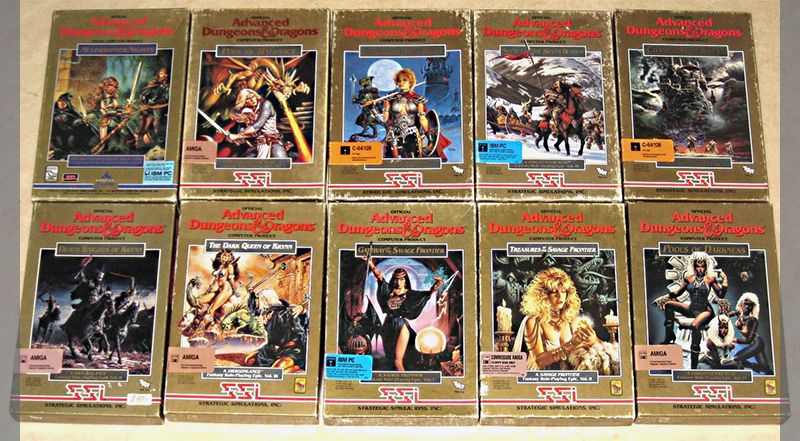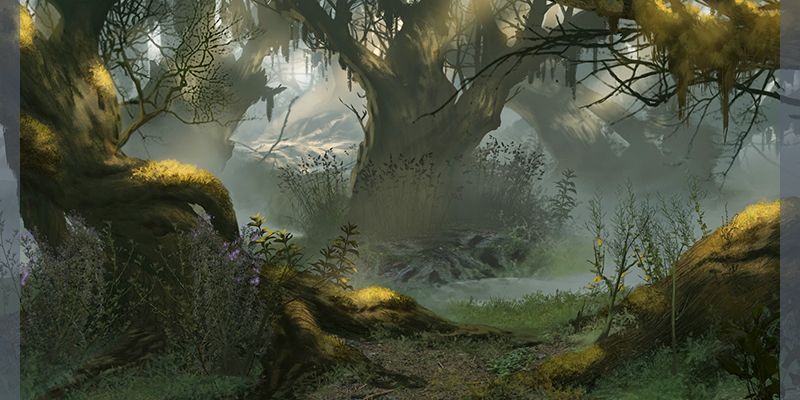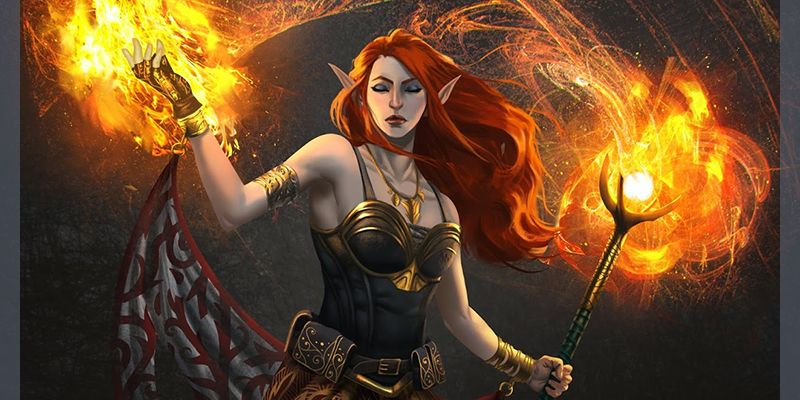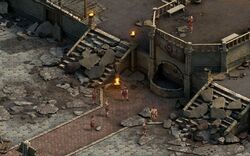RPG Codex Interview: Seven Dragon Saga - A Return To Golden Boxes
RPG Codex Interview: Seven Dragon Saga - A Return To Golden Boxes
Codex Interview - posted by Zed on Fri 10 October 2014, 20:27:11
Tags: Seven Dragon Saga; Tactical Simulations InteractiveTactical Simulations Interactive, or TSI Games, were kind enough to answer some of our questions regarding their upcoming (spiritual) successor to the GoldBox RPGs of the late 80s and early 90s: Seven Dragon Saga. From this interview, we learn with certainty that TSI will indeed go the route of crowdfunding Seven Dragon Saga. We also learn a thing or two about party sizes, combat, the world map and more.

RPG CODEX: Tactical Simulations Interactive (TSI) has more in common with the defunct Strategic Simulations Interactive (SSI) than just the name. Could you give us a run-down of SSI-related personnel involved in this project, and perhaps tell us a little about how you all got together (again) and started this project?
You are adapting your own intellectual property, the Seven Dragon Saga pen and paper system, for your studio's first RPG. It seems a little less traditional than the D&D worlds explored in the GoldBox titles. What can you tell us about Seven Dragon Saga – how it originated and what it's about?
While a new world is exciting, there were those who were hoping for a more direct sequel to the old GoldBox classics. Something D&D licensed. Were you ever in talks with external license holders? Could you say if there is any hope for another game in the Pool of Radiance, Savage Frontier or Dragonlance series in the future?

A beautiful GoldBox RPG collection. Photo courtesy of Codex master collector Luzur.
The early press release told us that Seven Dragon Saga will be turn-based. It also told us it would incorporate terrain advantages and destructible environments. Are you looking at something more dynamic like what Divinity: Original Sin did with its flammable oil patches, extinguishable fires and freezable water? Or will it be more passive, like in the vein of classic strategy games?
You mention the inclusion of 'modern design philosophies' on your website. What exactly are modern design philosophies to you, and how do they apply to this game?
In the press-release, one bullet-point touches on the importance of choices and consequences in the game. How will these choices be present, and how are you keeping track of the consequences? Will you be using something like a reputation system? Also, will there be any moral or ethical dispositions for characters – something like D&Ds alignment system?
How many characters will the player create in the start, and how many will the player be able to control in total (if there are hirelings/followers)? Will characters be exportable/importable – perhaps for a potential sequel?

The Northern Fens, one of the locations in Seven Dragon Saga. "North, beyond the smoking Firewind Peaks, lies a vast, trackless swamp. Ruins, far older and darker than those of the high plateaus beckon, but none who journey there return."
You have made it clear that Seven Dragon Saga is not another tale of a simple farmer's rise to power and glory. What exactly does this entail for the gameplay? Will the game still have the progression relative to a beginner's campaign, but cosmetically scaled up in power? Or will it be more like a playing a high level campaign off-the-bat?
What would you say is more accurate for encounter design within the framework of Seven Dragon Saga – fighting armies, or fighting strong individuals? I imagine a turn-based system would favor the latter, but the idea of being more powerful could support the first.
You have said you want to make Seven Dragon Saga a fully isometric game, instead of going for the trademark GoldBox combination of isometric combat with first person exploration. What are your reasons for this?
What about the world map, traveling and locations? For example, we have games like the original Fallout – with open world map exploration and areas that could be more or less void of combat. But we also have very combat-heavy games like the recent Blackguards where the map works more like a tool to get from one encounter to another. What games do you want Seven Dragon Saga to feel reminiscent of in its use of the world map, traveling and area design? How would you describe it?

A High Elf Wizard.
There were early speculations of Seven Dragon Saga becoming another crowdfunded title, but you recently confirmed that the game will be publisher/investor-backed. Could you provide any details about the financial workings? For instance, what kind of budget will you be working with – something like the average Kickstarter? Also, could this partnership exclude a DRM-free distribution option? (This question was written following a Kotaku article stating that the game wouldn't be crowdfunded. Lesson learned: don't read Kotaku. - Zed)
Birthed from the concept of “stretch-goals” in crowdfunding campaigns, many recent or upcoming RPGs feature guest writers, artists and musicians. With Unity in mind, there has also been some sharing of tech solutions (rendering, conversation systems, et cetera) and other collaborative efforts between studios. Are these types of guest appearances and collaborations anything you would be open to, even though you've decided on not crowdfunding? (Again, just do the world a favor and do not read Kotaku. - Zed)
Developers seem very optimistic when it comes to their development time and milestones. InXile said Wasteland 2 would be done in one-and-a-half years, but it took them an additional year to wrap up the release candidate. You've said that you want to see Seven Dragon Saga in the first quarter of 2016. Do you think that's enough time to create a complex RPG – one like Seven Dragon Saga?
Where do you see TSI heading after Seven Dragon Saga? Will you continue to feed the old-school nostalgiacs and deliver more GoldBox throwbacks? What are your hopes for the company, games, and market?
Big thanks to Tactical Simulations Interactive and Dead Good Media. They're cool people.

RPG CODEX: Tactical Simulations Interactive (TSI) has more in common with the defunct Strategic Simulations Interactive (SSI) than just the name. Could you give us a run-down of SSI-related personnel involved in this project, and perhaps tell us a little about how you all got together (again) and started this project?
TSI: The top personnel are as follows: Keith Brors and David Shelley created the Seven Dragon Saga role-playing system. David Shelley is acting as Producer/Lead Designer and Paul Murray is our Systems Designer. We've also had some contributions from SSI alumni such as Laura (Bowen) Shelley and Maurine Starkey. Honestly, our passion for these types of games has never wavered and a group of us meet regularly once a week for a tabletop session. David Klein, is a veteran business development executive that has a passionate for RPG's. His desire to see more Gold Box type games was the basis for forming the company.
You are adapting your own intellectual property, the Seven Dragon Saga pen and paper system, for your studio's first RPG. It seems a little less traditional than the D&D worlds explored in the GoldBox titles. What can you tell us about Seven Dragon Saga – how it originated and what it's about?
The developers of the Seven Dragon Saga are all long time game industry veterans with a passion for paper and pencil role-playing as well. While giving most new systems a try, the team decided they could do better. Being engineers, the system takes a lot from the algorithms and numerical balancing Keith, Paul, and David use when creating computer games. It has spent many years in development and polishing, so when TSI decided to do an original first title, Seven Dragon Saga was a natural choice.
For a setting, we wanted a world with more color than a classic medieval/Tolkien setting, without tying ourselves down to a specific real world culture. The Empire of the Seven Dragons rules much of the world and recruits powerful characters from all its lands, providing us the chance to create a variety of races. The Firewind Coast, where the first game takes place, has a classic fantasy feel, with more exotic environments and enemies found through exploration in ancient ruins and wastes.
In terms of combat, we decided to create broader, more cinematic moves, while retaining tactical choice. In terms of increased mobility, the opportunity to eliminate multiple opponents, and spectacular spell effects, we create a more visually exciting battlefield, and avoid the static stand and shoot feel of some turn based games. So we have a hybrid of Eastern (wuxia: leaping onto spires, appearing behind the enemy) and Western (Arthurian/Tolkien heavily armored knights, agile Elvish archery) character types, with the ability to customize the exact mix of abilities, and party balance.
For a setting, we wanted a world with more color than a classic medieval/Tolkien setting, without tying ourselves down to a specific real world culture. The Empire of the Seven Dragons rules much of the world and recruits powerful characters from all its lands, providing us the chance to create a variety of races. The Firewind Coast, where the first game takes place, has a classic fantasy feel, with more exotic environments and enemies found through exploration in ancient ruins and wastes.
In terms of combat, we decided to create broader, more cinematic moves, while retaining tactical choice. In terms of increased mobility, the opportunity to eliminate multiple opponents, and spectacular spell effects, we create a more visually exciting battlefield, and avoid the static stand and shoot feel of some turn based games. So we have a hybrid of Eastern (wuxia: leaping onto spires, appearing behind the enemy) and Western (Arthurian/Tolkien heavily armored knights, agile Elvish archery) character types, with the ability to customize the exact mix of abilities, and party balance.
While a new world is exciting, there were those who were hoping for a more direct sequel to the old GoldBox classics. Something D&D licensed. Were you ever in talks with external license holders? Could you say if there is any hope for another game in the Pool of Radiance, Savage Frontier or Dragonlance series in the future?
Obviously, we understand why core fans would love to see us return to those settings while gamers that don't have that frame of reference might simply be looking for a quality RPG. After we made the decision to start the company, the first question was: what should we do for our debut title? We made the conscious decision to do a fantasy game and felt that the timing was right for an original setting. We have had some initial dialogue with licensors about future opportunities.
Any time you're working with somebody else's IP you're adding another layer of expense and complexity. That means an additional approval process and determinations about what you CAN and CAN'T do. We have a lot of ideas and our whole team still appreciates D&D and the original Gold Box settings.
Any time you're working with somebody else's IP you're adding another layer of expense and complexity. That means an additional approval process and determinations about what you CAN and CAN'T do. We have a lot of ideas and our whole team still appreciates D&D and the original Gold Box settings.

A beautiful GoldBox RPG collection. Photo courtesy of Codex master collector Luzur.
The early press release told us that Seven Dragon Saga will be turn-based. It also told us it would incorporate terrain advantages and destructible environments. Are you looking at something more dynamic like what Divinity: Original Sin did with its flammable oil patches, extinguishable fires and freezable water? Or will it be more passive, like in the vein of classic strategy games?
We are looking to incorporate additional modern tactical choices, like Divinity: Original Sin offers with its elemental magic, but not to the exclusion of common advantages such as cover, flanking and height advantage. It will be rare that the solution to a battle is simply to light up a pool of oil. Each character's mobility, weapon and armor choices, and details of the environment will determine the best approach to each situation.
You mention the inclusion of 'modern design philosophies' on your website. What exactly are modern design philosophies to you, and how do they apply to this game?
The expansion in computing power, memory and video throughput provide modern designers a significantly different canvas to work on, than the 320x200 screens and 64K memory of early systems. Beyond the easy requirements of higher quality art and more extensive and rich worlds, the user experience also needs some modernizing. The game's interface needs to present players with useful and understandable choices at any given time. If each character in a combat has dozens of options, the system should make presenting the most useful choices to the player intuitive. The player should be spending his time implementing his plans, not seeking and digesting obscure information.
In the press-release, one bullet-point touches on the importance of choices and consequences in the game. How will these choices be present, and how are you keeping track of the consequences? Will you be using something like a reputation system? Also, will there be any moral or ethical dispositions for characters – something like D&Ds alignment system?
The player's party represents the Empire in a newly conquered land during a time of crisis, so the NPCs on all sides fall into factions, which we will track with a reputation system. Players' choices at critical junctures can also modify the relative strengths of these faction. For instance, if the player liberates a border fort, he may have the option to raise the flag of one faction or another, granting them control of the fortress and surrounding lands. Should they come to regret the choice, another conquest of the fort may be in order.
We are currently balancing out a Goals system for individual characters. During character creation, the player will be able to select from a limited list of Goals. When the resolution of a quest aligns with that character's goals, they receive a benefit. Not all quest resolutions will have the full range of Goal alignment, so simply having a 'Greedy' party will not provide an optimum solution. Choosing a range of sometimes conflicting goals provides the party a potentially greater benefit, but may begin to clash with the player's personal goals, or lead to the alienation of useful factions.
We are currently balancing out a Goals system for individual characters. During character creation, the player will be able to select from a limited list of Goals. When the resolution of a quest aligns with that character's goals, they receive a benefit. Not all quest resolutions will have the full range of Goal alignment, so simply having a 'Greedy' party will not provide an optimum solution. Choosing a range of sometimes conflicting goals provides the party a potentially greater benefit, but may begin to clash with the player's personal goals, or lead to the alienation of useful factions.
How many characters will the player create in the start, and how many will the player be able to control in total (if there are hirelings/followers)? Will characters be exportable/importable – perhaps for a potential sequel?
Having a full party right out of the gate is something we felt was missing from some of the other games on the market where you gather you party over time. So, we're looking to have the player create 4-6 playable characters (we are favoring 6 at the moment) and have NPC's be able to join for different situations. NPCs will provide story benefits, rather than significant combat firepower. We want to provide the player the control of creating and advancing all the character who will be key in battle and social situations.
Once you've taken the time to create a party of characters you care about, you certainly want to find ways to continue that experience rather than re-roll a fresh party. Exporting/importing of characters is something we're very excited about.
Once you've taken the time to create a party of characters you care about, you certainly want to find ways to continue that experience rather than re-roll a fresh party. Exporting/importing of characters is something we're very excited about.

The Northern Fens, one of the locations in Seven Dragon Saga. "North, beyond the smoking Firewind Peaks, lies a vast, trackless swamp. Ruins, far older and darker than those of the high plateaus beckon, but none who journey there return."
You have made it clear that Seven Dragon Saga is not another tale of a simple farmer's rise to power and glory. What exactly does this entail for the gameplay? Will the game still have the progression relative to a beginner's campaign, but cosmetically scaled up in power? Or will it be more like a playing a high level campaign off-the-bat?
Missing all of your attacks and having 4 HP simply isn't fun. Players can expect to start at a mid-level of proficiency with a reasonable set of skills and abilities to choose from. This means the player will not advance as quickly as some games where 10th level is only a couple of hours away, but endgame characters are more flexible and powerful. Part of this is through incremental improvements (spending points on abilities), part through acquiring new powers, and part through equipment (loot and constructed).
What would you say is more accurate for encounter design within the framework of Seven Dragon Saga – fighting armies, or fighting strong individuals? I imagine a turn-based system would favor the latter, but the idea of being more powerful could support the first.
Enemies in Seven Dragon Saga fall into four broad groups: from weaker Grunts to powerful Overlords. These groups work well in combination and in isolation. Grunts are most interesting in large numbers, and Seven Dragon Saga provides the player with many options for eliminating multiple enemies at a time, preventing horde battles from becoming inordinately long.
An Overlord, screened by Soldiers and Grunts, and supported by Superiors presents players with more complex challenges. Add to this the mix of ranged vs. melee, slow vs. fast, magical vs. physical opponents, and each battle can take on a different texture. And the environment presents its own benefits to one style over another.
An Overlord, screened by Soldiers and Grunts, and supported by Superiors presents players with more complex challenges. Add to this the mix of ranged vs. melee, slow vs. fast, magical vs. physical opponents, and each battle can take on a different texture. And the environment presents its own benefits to one style over another.
You have said you want to make Seven Dragon Saga a fully isometric game, instead of going for the trademark GoldBox combination of isometric combat with first person exploration. What are your reasons for this?
When your party is out exploring we didn't want to suddenly shift to another tactical map for combat. Instead, you're being moving through the world in formation and already be looking at the landscape to determine where to position your characters.
What about the world map, traveling and locations? For example, we have games like the original Fallout – with open world map exploration and areas that could be more or less void of combat. But we also have very combat-heavy games like the recent Blackguards where the map works more like a tool to get from one encounter to another. What games do you want Seven Dragon Saga to feel reminiscent of in its use of the world map, traveling and area design? How would you describe it?
Larger scale travel is on a strategic level map with the party represented by a single icon. As the player moves around the map, they can trigger encounters, both combat and social, discover new locations, and deal with some natural skill challenges. This eliminates long periods without meaningful encounters, while preserving the potential for surprise and discovery.

A High Elf Wizard.
There were early speculations of Seven Dragon Saga becoming another crowdfunded title, but you recently confirmed that the game will be publisher/investor-backed. Could you provide any details about the financial workings? For instance, what kind of budget will you be working with – something like the average Kickstarter? Also, could this partnership exclude a DRM-free distribution option? (This question was written following a Kotaku article stating that the game wouldn't be crowdfunded. Lesson learned: don't read Kotaku. - Zed)
Until recently we wished to keep our options open between the two models, but now we have chosen to go the crowdfunding route, seeking funds similar in scale to comparable titles. We definitely intend to be DRM-free on release.
Birthed from the concept of “stretch-goals” in crowdfunding campaigns, many recent or upcoming RPGs feature guest writers, artists and musicians. With Unity in mind, there has also been some sharing of tech solutions (rendering, conversation systems, et cetera) and other collaborative efforts between studios. Are these types of guest appearances and collaborations anything you would be open to, even though you've decided on not crowdfunding? (Again, just do the world a favor and do not read Kotaku. - Zed)
We welcome opportunities for feature guests to act as collaborators, though we have no specifics to announce at this time. When key personnel have a previous relationship from working closely together on past projects, such as inXile and Obsidian, there's a connection both with the people and the IP. That allows for a closer collaboration between different studios. In our case, we're fortunate to have our peers provide a great deal of support around our efforts.
Developers seem very optimistic when it comes to their development time and milestones. InXile said Wasteland 2 would be done in one-and-a-half years, but it took them an additional year to wrap up the release candidate. You've said that you want to see Seven Dragon Saga in the first quarter of 2016. Do you think that's enough time to create a complex RPG – one like Seven Dragon Saga?
We don't have a hard deadline we have to hit. Obviously, things changes during game development and what's important is shipping a product that everybody can be proud of. Like any other project we do have to work within the constraints of our production budget. When you look at something like Wasteland 2 or Pillars of Eternity there's the base game and then you factor in stretch goals and the final working budget. What everybody really wants is to ship a game when it is ready.
Where do you see TSI heading after Seven Dragon Saga? Will you continue to feed the old-school nostalgiacs and deliver more GoldBox throwbacks? What are your hopes for the company, games, and market?
We love the Gold Box games and we're inspired by all the support we've received since forming the company. Big publishers had shied away from making these types of games but we know there's an audience. Right now we're definitely focused on creating RPG's that allow you to PLAY YOUR WAY. That means allowing full customization and control over the party and tailoring things to your style of play. Ultimately, we'd like to do a blend of original and licensed IP. Game development today shouldn't be done in isolation away from the community. Going forward, we'll be able to engage our audience to shape the direction of our work and with the proper level of support we'll be able to do it for years to come.
Big thanks to Tactical Simulations Interactive and Dead Good Media. They're cool people.
There are 66 comments on RPG Codex Interview: Seven Dragon Saga - A Return To Golden Boxes














